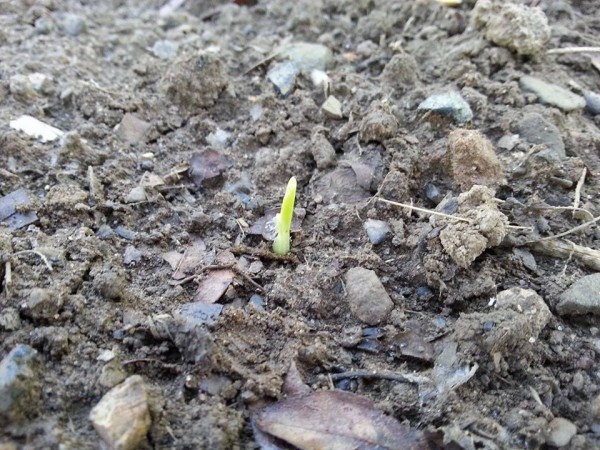-

Erin Donahue -

Christina Barkanic -

Brittany Trott -

Emily Wiley -

Jessica Reilley -

Chris Raines -

Will Nichols -

Emily Reddy -

Michele Marchetti -

Michele Frank -

James Gherardi -

Kit Henshaw -

Christina and Erin -

Kim Tait -

Erin McKinney -

Steve Spanelli -

Sam Komlenic -

Katherine Taylor Grofic -

James Eisenstein -

Jamie Oberdick -

Anna Lombardo -

LacCreta Holland -

Tony Ricci -

Local Food Journey -

Laura Young -

Kristin Camplese -

Harrison's Fresh + Local -

Danielle Matalonis -

Kristine A. -

Linda Weaver -

Naomi Elle Schwartz -

Dana Stuchul -

Cara McShane -

Brittany Smith -

Jessica Illuzzi - Frosty
-

Jessica Paholsky -

James Sechrengost -

Brad Yeckley -

Maya Althouse -

Jordan Reabold -

Kim Chase -

Maria Bryant - Alexandrea Scott
Why your seeds didn’t germinate
Posted by Jamie Oberdick on 06/10, 2014 at 08:29 AM

Corn seedling from a seed that did germinate.
One of the more frustrating things in gardening is taking time to prepare a garden bed, plant seeds, and then have them not germinate. The good news is, you have time to replant many vegetables in the garden.
So, when you do replant, here are some tips to help you avoid germination issues in the new planting:
Plant when the soil is warm enough: Planting now is actually better than planting in mid-May for certain seeds such as beans, pumpkins, and corn, which need warm soil temperatures to germinate. By now, the soil is warm enough for them to sprout.
Don’t plant too deep: It’s a good idea to read up on how deep you should plant the seeds before you do so. With mobile devices, you can take this information out to the garden with you. Or, a good of rule of thumb is never plant a seed deeper than three times the seed’s diameter.
Make sure the soil is prepared property: Don’t over fertilize soil; make sure you follow directions. If you found you have over fertilized, add some peat moss to the soil. Also, don’t use uncomposted manure; uncomposted manure creates so much heat in the soil it can actually burn the seed.
Use new seed: If you are using old seed and it didn’t germinate, it may be past viability and you may need to use new or newer seed.
Don’t overwater: Once you plant the seeds, tap down the soil so the soil makes contact with the seed, then water if rain is not expected. You want to keep the soil moist but do not overwater. This will cause the seed to rot before germination.
Again, you still have time to plant most vegetables, so if you have any seeds that didn’t germinate, get back out there and plant some seeds!
![]() Author: Jamie Oberdick
Author: Jamie Oberdick
Bio: Editor, Local Food Journey | Passionate about supporting local food in Central PA
- Our Local Food Journey comes to an end
- Winter isn’t a quiet time at the farm
- Get the taste of garden season right now by growing herbs indoors
- All you need to know about PASA’s Farming for the Future conference









NO COMMENTS